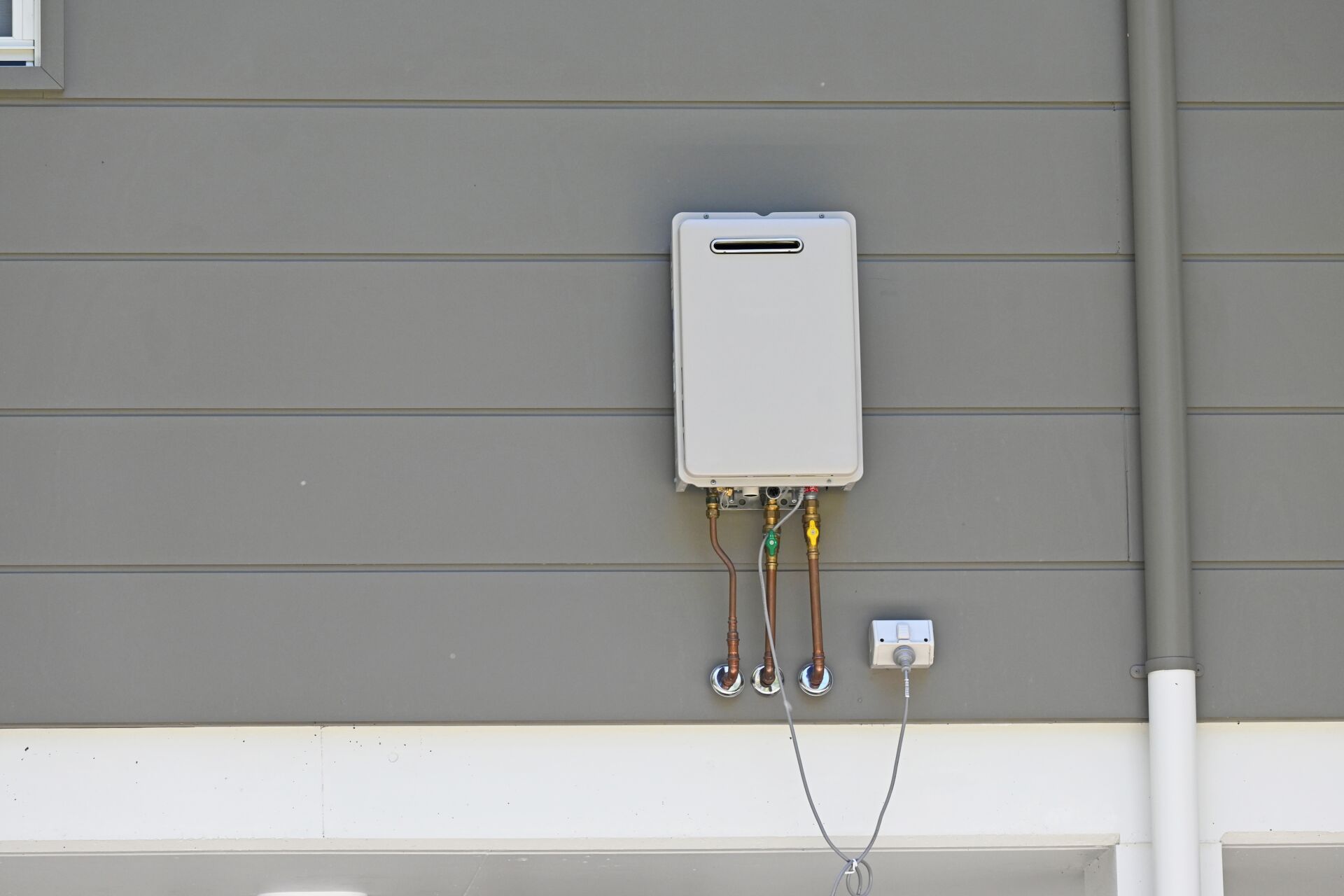A new hot water system can be a sizable investment for a household but knowing which one suits your needs and your property can help you save on purchase and installation costs. This Canstar Blue guide looks at gas hot water systems, how they work and how much they cost, so you can make an informed decision on whether it’s the right choice for your home.
On this page:
What is a gas hot water system?
A gas hot water system uses natural gas or liquified petroleum gas (LPG) to heat water for household use. There are three main types of gas hot water systems: storage systems, continuous flow systems (also called instantaneous systems) and solar hot water systems with instantaneous gas boosting.
Compare gas deals
Gas Plans Compared in VIC
Here are some of the cheapest gas deals on our database for VIC. These estimated annual costs are based on the Australian Gas Network in Melbourne and yearly gas usage of 29,830MJ, but prices will vary depending on your circumstances. We show one product per retailer, listed in order of lowest estimated cost. This table includes products from referral partners†. Our database may not cover all deals in your area, and please check retailer websites for up to date information.
Gas Plans Compared in NSW
Here are some of the cheapest gas deals on our database for NSW. These estimated annual costs are based on the Jemena Gas Network in Sydney and yearly gas usage of 18,542MJ, but prices will vary depending on your circumstances. We show one product per retailer, listed in order of lowest estimated cost. This table includes products from referral partners†. Our database may not cover all deals in your area, and please check retailer websites for up to date information.
Gas Plans Compared in WA
Here are some of the cheapest gas deals on our database for WA. These estimated annual costs are based on the ATCO Network in Perth and yearly gas usage of 7,672 (units), but prices may vary depending on your circumstances. We show one product per retailer, listed in order of lowest estimated cost. This table includes products from referral partners†. Our database may not cover all deals in your area, and please check retailer websites for up to date information.
Gas Plans Compared in SA
Here are some of the cheapest gas deals on our database for SA. These estimated annual costs are based on the Australian Gas Network in Adelaide and yearly gas usage of 11,875MJ, but prices will vary depending on your circumstances. We show one product per retailer, listed in order of lowest estimated cost. This table includes products from referral partners†. Our database may not cover all deals in your area, and please check retailer websites for up to date information.
Gas Plans Compared in QLD
Here are some of the cheapest gas deals on our database for QLD. These estimated annual costs are based on the Australian Gas Network in Brisbane and yearly gas usage of 6,842MJ, but prices will vary depending on your circumstances. We show one product per retailer, listed in order of lowest estimated cost. This table includes products from referral partners†. Our database may not cover all deals in your area, and please check retailer websites for up to date information.
How does a gas hot water system work?
Storage gas hot water systems use a gas burner to heat water stored in a tank. These systems usually have a continuously burning pilot flame, which keeps the water at a set temperature throughout the day, waiting for use as needed.
A continuous, or instantaneous system, heats water as it is released. Unlike a storage system, there are no tanks in continuous systems. These systems rely on heat exchangers to keep water warm as it moves directly to the relevant tap, after being heated by a gas burner. According to Elgas, continuous gas hot water systems are generally considered to be the more energy and cost-efficient option.
Solar hot water systems with gas boosters rely on solar energy to heat water and only use gas as a backup energy source on rainy or cloudy days or at nighttime when solar energy isn’t being generated.
Gas hot water system prices
The price of gas hot water systems varies. Depending on gas hot water system specifics, customers can expect to pay anywhere between $900 – $2,000. Prices will vary depending on the system type (instantaneous or storage) size, gas connection and number of taps or devices the system serves.
Gas hot water system installation costs come at an additional charge on top of the system purchase price. Installation prices typically range from $1,500 – $3,000 for a new gas system, or $500 – $800 for a replacement system. A replacement system is much cheaper because the gas connections are already available from an existing unit.
Looking to install a new hot water system in your home? Compare pricing, tips and leading brands in Canstar Blue’s hot water system installation guide.
What are the benefits of a gas hot water system?
Some advantages of installing a gas hot water system are:
- Energy efficiency: According to Everyday Plumbing & Gas Services, an instantaneous gas hot water system uses less energy than a traditional hot water system because energy isn’t wasted on maintaining storage tank heat.
- Easy to install: As long as you are connected to your local gas mains, gas hot water systems are generally simple to install at home.
- Older models have off-grid capabilities: If you are using a 100% gas-powered traditional hot water system, then you may still have hot water during a power outage. Please note that this is typically only applicable to older systems.
How much does it cost to run a gas hot water system?
Gas hot water system usage costs will depend on your household size, system type and gas prices in your distribution area. According to Sustainability Victoria, instantaneous systems have a better gas energy rating than storage systems but a higher gas consumption rate.
To give you an idea of what you could pay on your energy bill, Canstar Blue has collected annual estimated costs for instantaneous and storage gas hot water systems across Australia.
Average annual gas water heater running costs (200L per day)
← Mobile/tablet users, scroll sideways to view full table →
| Gas water heater type | Average annual gas consumption (MJ) | National average | Sydney | Melbourne | Brisbane | Adelaide | Perth | Hobart | Canberra |
|---|---|---|---|---|---|---|---|---|---|
| Instantaneous | 18,539MJ | $686 | $667 | $630 | $908 | $630 | $760 | $1,001 | $723 |
| Storage | 21,460MJ | $794 | $773 | $730 | $1,052 | $730 | $880 | $1,159 | $837 |
Source: www.canstarblue.com.au – 15/08/2024. Average energy consumption figures based on gas hot water heaters listed in the Commonwealth of Australia E3 Program’s Registration database, which assumes delivering 200L of hot water per day. Annual gas usage cost estimates based on the average annual national gas usage rate of 3.7 c/MJ, 3.9 c/MJ in Canberra, 3.6 c/MJ in Sydney, 4.9 c/MJ in Brisbane, 4.1 c/MJ in Perth, 3.4 c/MJ in Adelaide, 3.4 c/MJ in Melbourne and 5.4 c/MJ in Hobart. Average gas usage rates are based on summer rates of single-rate plans in Canstar’s database, available for an annual usage of 33,625 MJ.
This data shows that households in Hobart on average have the highest bills for gas hot water systems, while Adelaide and Melbourne have the lowest on average.
Worried about how much hot water you are using at home? Compare your bills against the average water bill costs of everyday consumers, with Canstar Blue’s average water billing data report.
Is a gas hot water system right for me?
Picking the right gas hot water system will depend on a number of factors such as household size, location and energy connections within the property. If you already have a mains gas connection at your home, then you may find value in connecting a gas hot water system. Larger households may also find some benefit in gas hot water due to these systems’ higher recovery rates. The recovery rate refers to how quickly the system heats water back to the required temperature after hot water is used. This is important as it can affect household water usage according to the My Heat Pump Quotes website.
If you don’t have a gas mains connection, consider if it’s worth paying the additional cost to install one. According to hipages, a new gas connection can cost between $70 and $110, depending on location.
For further information on hot water systems, check out Canstar Blue’s Best-Rated Hot Water Systems.
Image credits: Douglas Cliff/Shutterstock.com



Share this article